How to Prepare for a Hurricane and Protect Your Home
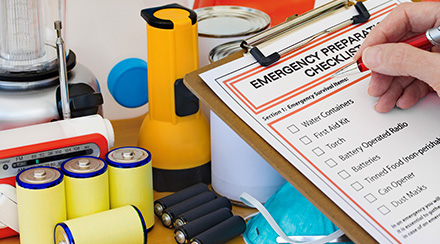
Hurricanes and tropical storms often bring destructive winds, deadly storm surges and torrents of rain that can quickly turn into flash floods. Fortunately, hurricane forecast models have become so sophisticated that people in coastal regions usually have a few days to prepare for a possible landfall. Whether you evacuate ahead of a storm or ride it out at home, taking early action is key to protecting your family and home.
Hurricane Preparedness: Before the Storm
Even though you’re likely to have a few days’ warning before a hurricane makes landfall near you, there are several things you can do to prepare far in advance. Taking care of these tasks before the start of hurricane season will free up precious time for other preparations when a hurricane is imminent.
Assemble Your Emergency Kit
A fully stocked emergency kit should contain all the essentials you and your family need to survive for a few days, even if the power is out and nearby stores are closed. A proper emergency kit should include the following:
- At least a three-day supply of nonperishable food and bottled water for every person in the home. You should have one gallon of water per person, per day at minimum.
- Flashlights and batteries
- Battery-operated radio
- Supply of necessary medications
- First aid kit
- Portable power sources for electronics, which may include spare batteries, power banks and small solar chargers
- Copies of important documents, including birth certificates and homeowners insurance cards
- Supplies for pets, if applicable, including medications, food and water
- A small amount of cash
You know your own needs better than anyone else, so if you think you’ll need something else in an emergency, include it in the kit. Even if you decide to evacuate ahead of the storm, taking your kit with you will make sure you have the basics covered.
Draft a Family Communications Plan
Write down important contact information and schedules for every member of the family, and make sure this information is shared among all family members. Designate a variety of emergency meeting places for your family in the event that communications systems are compromised. FEMA offers a step-by-step guide to creating an emergency communications plan that will help your family stay in touch before, during and after a hurricane or other disaster.
Install Emergency Apps
Not long ago, a battery-operated weather radio was the essential device for receiving up-to-date information during a hurricane. These radios are still useful as ever and a great thing to have in your emergency kit, but smartphone apps have taken over as the most helpful way to keep in touch throughout a weather emergency.
Institutions like FEMA and the Red Cross have mobile apps with a variety of tools for people experiencing a disaster, and many energy utilities provide apps that can be used to report power outages, track service estimates and receive breaking information. Local news and weather apps may also be useful resources during a hurricane. And if you don’t have a smartphone, you may still be able to sign up for text alerts from your energy utilities and state and local government agencies. Install these apps early and familiarize yourself with them so you’re ready to stay connected when a hurricane arrives.
Prepare a Generator
If you want to be able to ride out a hurricane and its aftermath at home, you may want to invest in an emergency generator so that you have access to electricity during a prolonged power outage. Generators are high-involvement purchases that can range from a few hundred dollars to several thousand, and depending on your desired configuration, you may need to have some professional electrical work done in advance. There are also critical safety guidelines that you must learn before you can operate a generator safely.
Check out our generator buying guide for in-depth information on how to choose, install and safely operate an emergency generator at your home.
Locate Water, Gas and Electricity Shut-Offs
Hopefully, you won’t need to shut off your water, gas or electricity at the source, but it pays to know where and how to do this. You may even want to shut these utilities down preemptively if you plan to evacuate.
Your electricity can be controlled at your main electrical panel; there is usually one main circuit breaker switch that can be used to disconnect all electricity in your home. Natural gas lines will have a main shut-off valve that you may be able to turn by hand, or it may require a wrench. Main water valves often do require a wrench or other tool to open and close, and these valves can be difficult to locate. It may be in the basement, attached to your home’s exterior or even underground beneath a grate. If you cannot find one or more of these valves, contact the relevant utility for help.
Hurricane Preparedness: When a Hurricane Is Imminent
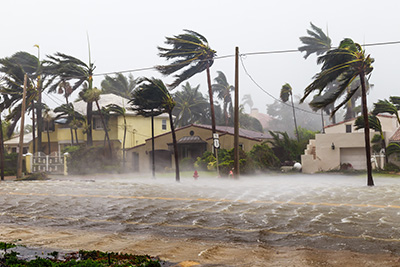
Stay or Go?
One of the most important decisions to make when a hurricane is approaching is whether to evacuate or ride out the storm at home. Riding out a storm can be dangerous, and you may be left without electricity for several days. But evacuating can also be difficult, especially if you don’t own a reliable vehicle.
Listen to announcements from local authorities about storm preparation, especially if mandatory evacuations are discussed. Authorities may order mandatory evacuations for areas they deem especially at risk, so if you find yourself in one of these areas, you should make plans to evacuate as soon as possible. If you need assistance, contact your local authorities to explain your situation.
If you plan to evacuate, fill your car’s gas tank and prepare your vehicle as early as possible. You may encounter long lines at filling stations. If you plan to stay, make sure you know where your nearest emergency shelters are located in the event your home is damaged. If you’ll be using a fuel-burning generator, you should also stock up on a supply of fuel that will last at least a few days.
Batten Down the Hatches
Secure anything outside your home that could get blown away, including patio furniture, potted plants and lawn care equipment. If you have storm shutters, install or close them. In addition to the risk of losing unsecured items, they could become airborne and damage your home or those of your neighbors.
Prepare Your Fridge and Freezer
There’s always a risk of losing your perishable food during a hurricane due to prolonged power outages. But you can make cleanup easy with a little prep work. Empty and clean your refrigerator and freezer to help prevent odors from developing if you lose power. Then, place your food in plastic bags before putting it back inside. If your food becomes unsafe, all you have to do is grab the bags and toss them out. This is an especially helpful step if you choose to evacuate, because you never know how long it will be before you can return, and cleaning up rancid groceries is a stomach-turning task.
If your power goes out, refrigerated foods will stay safe for four hours, as long as you don’t open the refrigerator door. Frozen foods will stay safe for 48 hours in a full freezer and 24 hours in a half-full freezer.
Unplug Your Appliances and Electronics
Because the risk of a power outage is so high, it’s a good idea to completely disconnect unnecessary appliances and electronics before high winds arrive. Power outages from downed lines or damaged transformers can create surges of voltage that may damage your property, especially sensitive electronics.
Hurricane Preparedness: During the Storm
Stay Inside
If you’re riding out the storm at home, stay indoors and away from windows until the storm has completely passed. Make sure you know where your emergency kit is located, and keep a flashlight, mobile phone and battery-operated radio near you. Use the radio and your smartphone to monitor conditions and listen for official announcements.
Stay Alert
Structural damage or rising floodwaters could force you from your home in a worst-case scenario. If this happens, you may need to seek cover in the nearest available safe shelter, likely a neighbor’s house. Call 911 for instructions if you’re able to temporarily continue sheltering in place. If you move to a vehicle, do not attempt to drive through standing water – it can be difficult to judge how deep it is.
Hurricane Preparedness: After the Storm
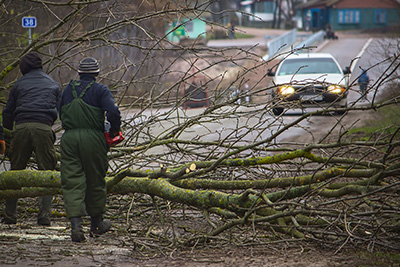
Assess the Damage
When it is safe, thoroughly inspect your home for damage inside and out. Take photos of any damage, if possible, so you can send them to your homeowners insurance carrier later.
If you see downed power lines, do not approach them. Contact your local electrical utility or police department to report them.
Listen for Instructions
Local authorities typically make a series of announcements in the wake of a hurricane to communicate damage reports, utility restoration estimates, relief efforts and other important information. Listen to these reports carefully, and if authorities ask evacuees to delay their return until conditions are safe, check with your local authorities or FEMA to find out what kind of emergency relief you might qualify for.
Wait to Plug In Appliances
If your power is out, wait until it is restored before plugging your appliances and electronics back in. There is often another power surge when the electricity comes back on.
Set Up Your Generator
If you have an emergency generator, you can set it up once the high winds and heavy rains have subsided. Some generators, like standby generators powered by natural gas, will turn on automatically when power is interrupted. Portable fuel-burning generators must be set up a safe distance (at least 20 feet) from living spaces and connected safely – either directly to appliances using an extension cord rated for generators or to a transfer switch, which must be installed ahead of time by an electrician.
Hurricanes are some of the most dangerous and destructive weather events on Earth, and we typically see multiple landfalls every hurricane season. Take these storms seriously by preparing early and acting quickly when a hurricane landfall is predicted for your area.
Looking for Something Specific?
Select a category to find resources for topics that interest you.
Select Category

Related Articles:
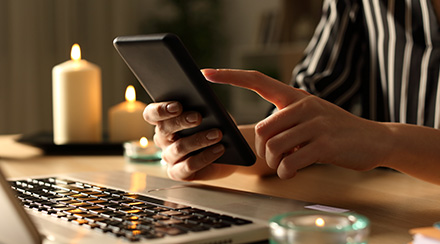
What to Do Before, During and After Power Outages
With a little knowledge and preparation, you can protect yourself, your home and your belongings during power outages of any duration.
Read Article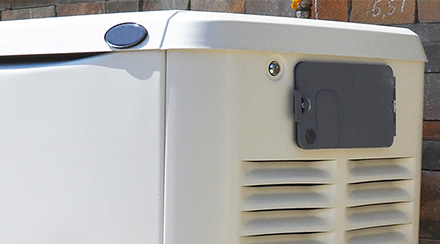
How to Choose a Generator for Your Home
Power outages can be miserable, but with the right generator, you can keep your family safe and comfortable until power is restored. Learn how to choose the best generator for your home.
Read Article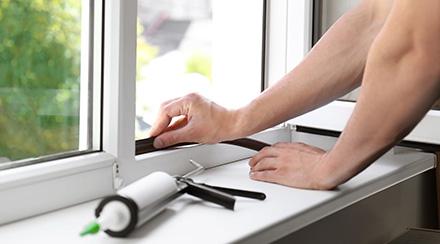
Weatherize Your Home for Summer
The extreme heat of summer can really do a number on your energy bills. But if you’re able to invest a little time and money into weatherizing to keep your home cool, you can help yourself and your family remain comfortable at home while still saving energy.
Read ArticleMost Popular Articles
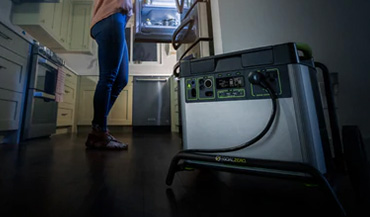
Power On the Go
GoalZero's portable and whole-home power products help you get the energy you need, whenever and wherever you need it. Learn More.
How to Prepare for a Hurricane and Protect Your Home
Hurricanes and tropical storms often bring destructive winds, deadly storm surges and torrents of rain that can quickly turn into flash floods. Fortunately, hurricane forecast models have become so sophisticated that people in coastal regions usually have a few days to prepare for a possible landfall. Whether you evacuate ahead of a storm or ride it out at home, taking early action is key to protecting your family and home.
Hurricane Preparedness: Before the Storm
Even though you’re likely to have a few days’ warning before a hurricane makes landfall near you, there are several things you can do to prepare far in advance. Taking care of these tasks before the start of hurricane season will free up precious time for other preparations when a hurricane is imminent.
Assemble Your Emergency Kit
A fully stocked emergency kit should contain all the essentials you and your family need to survive for a few days, even if the power is out and nearby stores are closed. A proper emergency kit should include the following:
- At least a three-day supply of nonperishable food and bottled water for every person in the home. You should have one gallon of water per person, per day at minimum.
- Flashlights and batteries
- Battery-operated radio
- Supply of necessary medications
- First aid kit
- Portable power sources for electronics, which may include spare batteries, power banks and small solar chargers
- Copies of important documents, including birth certificates and homeowners insurance cards
- Supplies for pets, if applicable, including medications, food and water
- A small amount of cash
You know your own needs better than anyone else, so if you think you’ll need something else in an emergency, include it in the kit. Even if you decide to evacuate ahead of the storm, taking your kit with you will make sure you have the basics covered.
Draft a Family Communications Plan
Write down important contact information and schedules for every member of the family, and make sure this information is shared among all family members. Designate a variety of emergency meeting places for your family in the event that communications systems are compromised. FEMA offers a step-by-step guide to creating an emergency communications plan that will help your family stay in touch before, during and after a hurricane or other disaster.
Install Emergency Apps
Not long ago, a battery-operated weather radio was the essential device for receiving up-to-date information during a hurricane. These radios are still useful as ever and a great thing to have in your emergency kit, but smartphone apps have taken over as the most helpful way to keep in touch throughout a weather emergency.
Institutions like FEMA and the Red Cross have mobile apps with a variety of tools for people experiencing a disaster, and many energy utilities provide apps that can be used to report power outages, track service estimates and receive breaking information. Local news and weather apps may also be useful resources during a hurricane. And if you don’t have a smartphone, you may still be able to sign up for text alerts from your energy utilities and state and local government agencies. Install these apps early and familiarize yourself with them so you’re ready to stay connected when a hurricane arrives.
Prepare a Generator
If you want to be able to ride out a hurricane and its aftermath at home, you may want to invest in an emergency generator so that you have access to electricity during a prolonged power outage. Generators are high-involvement purchases that can range from a few hundred dollars to several thousand, and depending on your desired configuration, you may need to have some professional electrical work done in advance. There are also critical safety guidelines that you must learn before you can operate a generator safely.
Check out our generator buying guide for in-depth information on how to choose, install and safely operate an emergency generator at your home.
Locate Water, Gas and Electricity Shut-Offs
Hopefully, you won’t need to shut off your water, gas or electricity at the source, but it pays to know where and how to do this. You may even want to shut these utilities down preemptively if you plan to evacuate.
Your electricity can be controlled at your main electrical panel; there is usually one main circuit breaker switch that can be used to disconnect all electricity in your home. Natural gas lines will have a main shut-off valve that you may be able to turn by hand, or it may require a wrench. Main water valves often do require a wrench or other tool to open and close, and these valves can be difficult to locate. It may be in the basement, attached to your home’s exterior or even underground beneath a grate. If you cannot find one or more of these valves, contact the relevant utility for help.
Hurricane Preparedness: When a Hurricane Is Imminent
Stay or Go?
One of the most important decisions to make when a hurricane is approaching is whether to evacuate or ride out the storm at home. Riding out a storm can be dangerous, and you may be left without electricity for several days. But evacuating can also be difficult, especially if you don’t own a reliable vehicle.
Listen to announcements from local authorities about storm preparation, especially if mandatory evacuations are discussed. Authorities may order mandatory evacuations for areas they deem especially at risk, so if you find yourself in one of these areas, you should make plans to evacuate as soon as possible. If you need assistance, contact your local authorities to explain your situation.
If you plan to evacuate, fill your car’s gas tank and prepare your vehicle as early as possible. You may encounter long lines at filling stations. If you plan to stay, make sure you know where your nearest emergency shelters are located in the event your home is damaged. If you’ll be using a fuel-burning generator, you should also stock up on a supply of fuel that will last at least a few days.
Batten Down the Hatches
Secure anything outside your home that could get blown away, including patio furniture, potted plants and lawn care equipment. If you have storm shutters, install or close them. In addition to the risk of losing unsecured items, they could become airborne and damage your home or those of your neighbors.
Prepare Your Fridge and Freezer
There’s always a risk of losing your perishable food during a hurricane due to prolonged power outages. But you can make cleanup easy with a little prep work. Empty and clean your refrigerator and freezer to help prevent odors from developing if you lose power. Then, place your food in plastic bags before putting it back inside. If your food becomes unsafe, all you have to do is grab the bags and toss them out. This is an especially helpful step if you choose to evacuate, because you never know how long it will be before you can return, and cleaning up rancid groceries is a stomach-turning task.
If your power goes out, refrigerated foods will stay safe for four hours, as long as you don’t open the refrigerator door. Frozen foods will stay safe for 48 hours in a full freezer and 24 hours in a half-full freezer.
Unplug Your Appliances and Electronics
Because the risk of a power outage is so high, it’s a good idea to completely disconnect unnecessary appliances and electronics before high winds arrive. Power outages from downed lines or damaged transformers can create surges of voltage that may damage your property, especially sensitive electronics.
Hurricane Preparedness: During the Storm
Stay Inside
If you’re riding out the storm at home, stay indoors and away from windows until the storm has completely passed. Make sure you know where your emergency kit is located, and keep a flashlight, mobile phone and battery-operated radio near you. Use the radio and your smartphone to monitor conditions and listen for official announcements.
Stay Alert
Structural damage or rising floodwaters could force you from your home in a worst-case scenario. If this happens, you may need to seek cover in the nearest available safe shelter, likely a neighbor’s house. Call 911 for instructions if you’re able to temporarily continue sheltering in place. If you move to a vehicle, do not attempt to drive through standing water – it can be difficult to judge how deep it is.
Hurricane Preparedness: After the Storm
Assess the Damage
When it is safe, thoroughly inspect your home for damage inside and out. Take photos of any damage, if possible, so you can send them to your homeowners insurance carrier later.
If you see downed power lines, do not approach them. Contact your local electrical utility or police department to report them.
Listen for Instructions
Local authorities typically make a series of announcements in the wake of a hurricane to communicate damage reports, utility restoration estimates, relief efforts and other important information. Listen to these reports carefully, and if authorities ask evacuees to delay their return until conditions are safe, check with your local authorities or FEMA to find out what kind of emergency relief you might qualify for.
Wait to Plug In Appliances
If your power is out, wait until it is restored before plugging your appliances and electronics back in. There is often another power surge when the electricity comes back on.
Set Up Your Generator
If you have an emergency generator, you can set it up once the high winds and heavy rains have subsided. Some generators, like standby generators powered by natural gas, will turn on automatically when power is interrupted. Portable fuel-burning generators must be set up a safe distance (at least 20 feet) from living spaces and connected safely – either directly to appliances using an extension cord rated for generators or to a transfer switch, which must be installed ahead of time by an electrician.
Hurricanes are some of the most dangerous and destructive weather events on Earth, and we typically see multiple landfalls every hurricane season. Take these storms seriously by preparing early and acting quickly when a hurricane landfall is predicted for your area.
Looking for Something Specific?
Select a category to find resources for topics that interest you.
Select Category

Related Articles:

What to Do Before, During and After Power Outages
With a little knowledge and preparation, you can protect yourself, your home and your belongings during power outages of any duration.
Read Article
How to Choose a Generator for Your Home
Power outages can be miserable, but with the right generator, you can keep your family safe and comfortable until power is restored. Learn how to choose the best generator for your home.
Read Article
Weatherize Your Home for Summer
The extreme heat of summer can really do a number on your energy bills. But if you’re able to invest a little time and money into weatherizing to keep your home cool, you can help yourself and your family remain comfortable at home while still saving energy.
Read ArticleMost Popular Articles

Power On the Go
GoalZero's portable and whole-home power products help you get the energy you need, whenever and wherever you need it. Learn More.







